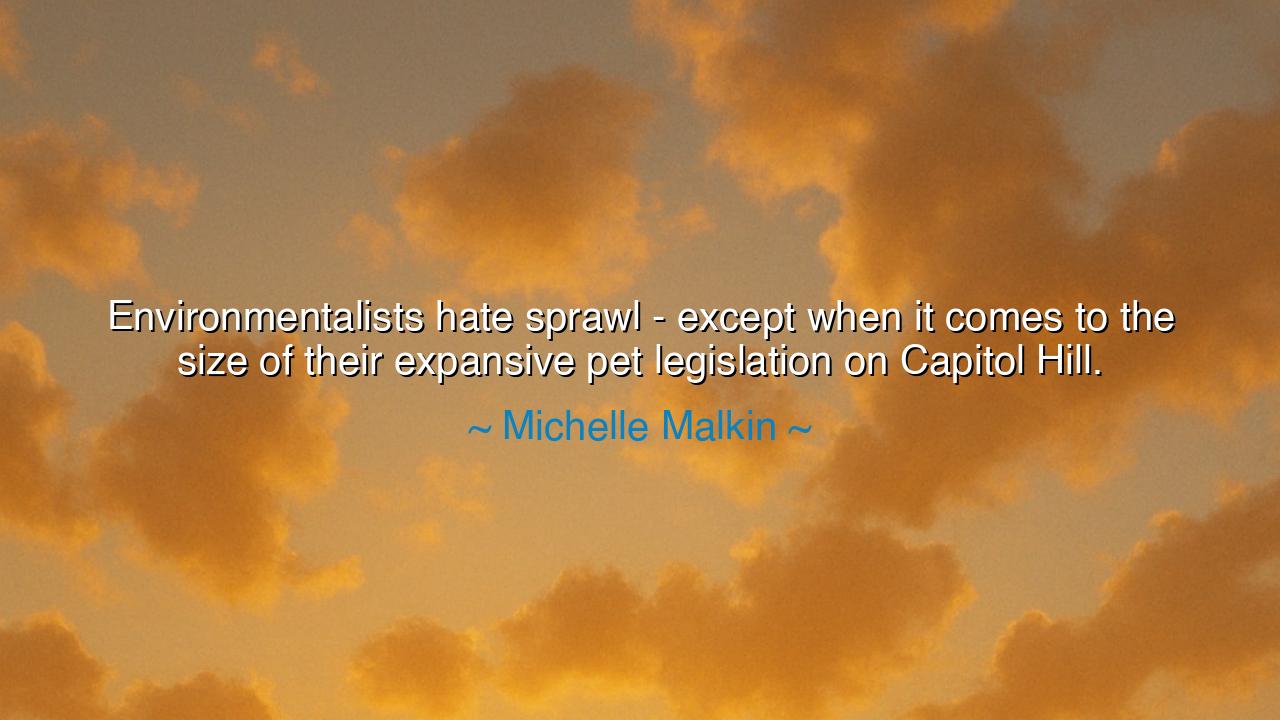
Environmentalists hate sprawl - except when it comes to the size
Environmentalists hate sprawl - except when it comes to the size of their expansive pet legislation on Capitol Hill.






The commentator Michelle Malkin once declared with sharp irony: “Environmentalists hate sprawl—except when it comes to the size of their expansive pet legislation on Capitol Hill.” At first, these words may sound like a jest cast at political rivals, but beneath them lies a deeper reflection on human nature, power, and the ancient tension between ideals and practice. For in them we hear not merely an accusation, but a warning: that even those who speak against excess may fall prey to it when their own causes are at stake.
The phrase hate sprawl calls to mind the battle against unchecked growth—the endless spread of cities, the devouring of forests, the loss of open lands to human greed. Environmentalists, noble in their mission, resist such expansion in the natural world. Yet, Malkin reminds us of another kind of sprawl—legislative sprawl, the swelling of laws, bills, and decrees in the halls of power. Here lies the paradox: while condemning the one, they embrace the other. And so her words strike at hypocrisy, revealing how even the most righteous can lose sight of balance when passion overtakes humility.
This tension is not new. History offers the example of Prohibition in the United States, a movement born of noble aims: to end drunkenness, violence, and suffering. Yet to enforce it, lawmakers produced endless legislation, swelling with complexity and unintended consequences. Instead of order, chaos spread—crime flourished, and the very virtue that reformers sought was undermined by their own legislative sprawl. In this tale, we see that good intentions, when bound in excessive law, may yield harm instead of healing.
The origin of Malkin’s remark lies in the eternal human flaw: the tendency to see the fault in others while excusing it in oneself. It is easy to condemn the sprawl of highways and suburbs while ignoring the sprawl of bureaucracy and red tape. It is easy to call for simplicity in nature while weaving labyrinths of complexity in governance. The ancients warned of this: “Physician, heal thyself,” they said, for hypocrisy is a shadow that follows every righteous cause.
Yet let us not hear these words as mockery alone. Let us hear them as a call to vigilance. For whether one stands as an environmentalist, a statesman, or a common citizen, the danger is the same: that passion for one’s cause blinds one to the mirror. Expansive legislation, like sprawling cities, can suffocate what it seeks to protect. What begins as a seed of justice may, if unchecked, become a thicket that entangles rather than liberates.
The lesson is clear: when striving for justice, whether in the earth or in the law, let balance be your guide. Speak not only against the excesses of others but guard against your own. Let your causes be pursued with clarity, precision, and humility, not drowned in endless words and measures. For the power of a law is not in its length, but in its wisdom; the beauty of a city is not in its size, but in its harmony.
Practical action follows from this wisdom. When you hear of new laws, do not ask only, “Does this seek a noble end?” Ask also, “Is this measured? Is this clear? Does it heal, or does it strangle?” When you advocate for a cause, seek simplicity before complexity, humility before grandeur. And when you condemn the sprawl of others, look within your own heart, lest your hand also be guilty of the same.
Thus the teaching resounds: “Environmentalists hate sprawl—except when it comes to the size of their expansive pet legislation on Capitol Hill.” Whether or not one shares Malkin’s stance, the wisdom remains. Beware of hypocrisy. Beware of excess. Let every cause, no matter how noble, be pursued with the discipline of balance. For without such discipline, even the brightest fire of justice may burn itself into ruin.






AAdministratorAdministrator
Welcome, honored guests. Please leave a comment, we will respond soon